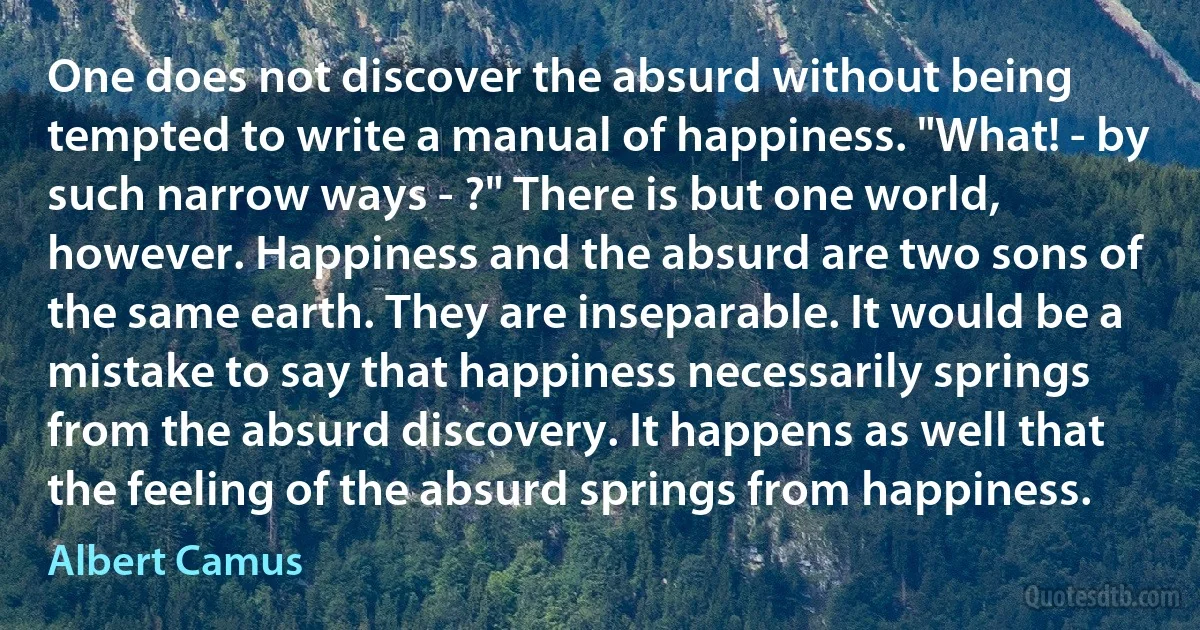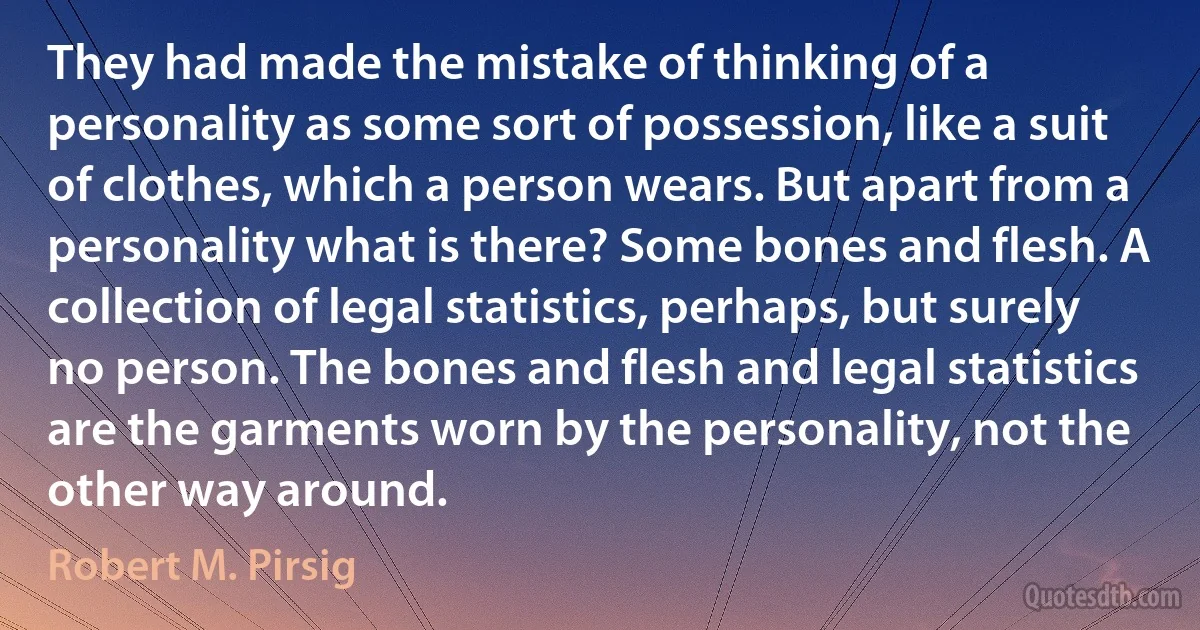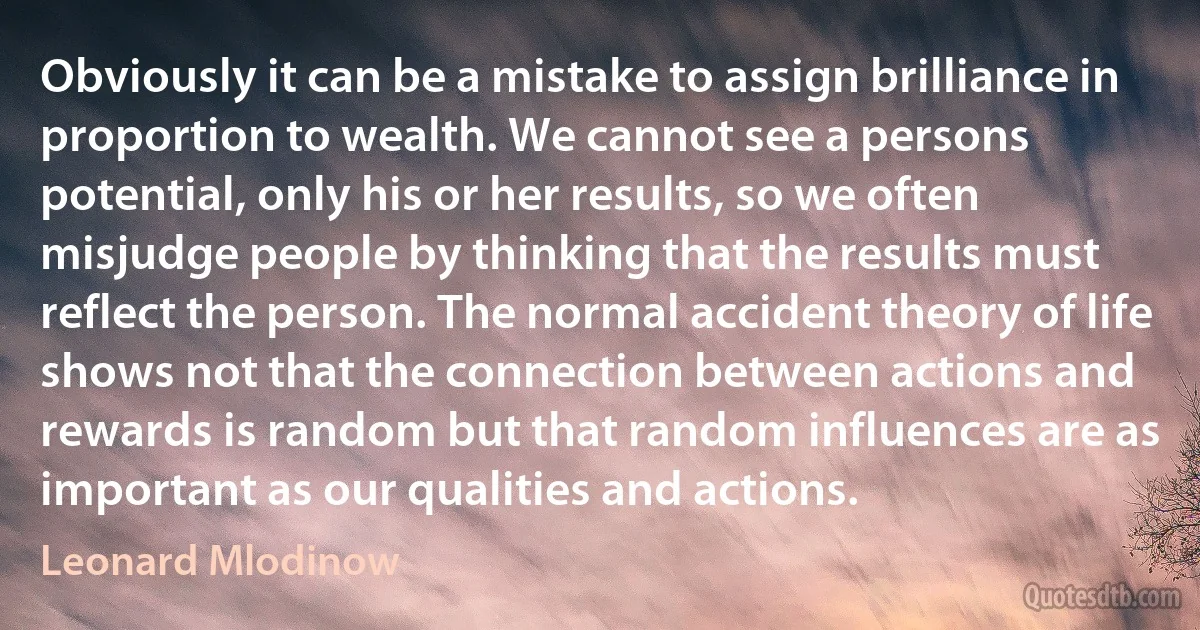Mistake Quotes - page 81
To see in Catholicism one religion among others, one system among others, even if it be added that it is the only true religion, the only system that works, is to mistake its very nature, or at least to stop at the threshold. Catholicism is religion itself. It is the form which humanity must put on in order finally to be itself.

Henri de Lubac
The whole Renaissance tradition is antipathic to me. The hard-and-fast rules of perspective which it succeeded in imposing on art were a ghastly mistake which it has taken four centuries to redress; Paul Cézanne and after him Picasso and myself can take a lot of credit for this.. ..scientific perspective forces the objects in a picture to disappear away form the beholder instead of bringing them within his reach as painting should.

Paul Cézanne
Put the guns into our hands and we will use them. Give us the slogans and we will turn them into realities. Sing the battle hymns and we will take them up where you left off. Not one, not ten, not ten thousand, not a million, not ten millions, not a hundred millions but a billion, two billions of us all - the people of the world. We will have the slogans and we will have the hymns and we will have the guns and we will use them and we will live. Make no mistake of it, we will live. We will be alive and we will walk and talk and eat and sing and laugh and feel and love and bear our children in tranquillity, in security, in decency, in peace. You plan the wars, you masters of men - plan the wars and point the way and we will point the gun.

Dalton Trumbo
We're not really the authors of our work: we're channels, tuning into another frequency, another dimension, and bringing that information down into the physical world, where - using the tools, the talents and perspectives that are uniquely ours - we transcribe and embellish that information, transforming it into that wonderful creature called a Story.
In the end, it doesn't matter whether the transmission is instant or unfolds slowly, it's the opening up that's so magical. That moment of realizing that you're connected to something so much bigger than yourself. I remember, years ago, when I was just beginning work on Moonshadow, standing in the shower - mouth open, eyes glazed, still as a statue - watching the ending of the series play out on the movie screen of my psyche. Make no mistake: I didn't create the scene, I just witnessed and transcribed it.

J. M. DeMatteis
Many years before Harry Truman fired General Douglas MacArthur, there was another prima donna general, the renowned John C. Frémont. For issuing orders authorizing the emancipation of slaves in Missouri without presidential permission, Lincoln fired him on the spot. As for MacArthur, he should have known better: the same thing had also happened to his own father. Back in the early 1900s, General Arthur MacArthur, military governor of the Philippines, made the stupid mistake of not recognizing the superior authority of the civilian governor, William Howard Taft, who later became president. Years later, when MacArthur's turn came to be promoted to Army Chief of Staff, Taft blackballed him.

William Howard Taft
Do not be mistaken about the word "Substance.” Spinoza took it in its purest meaning, and had to take it in that way if he wanted to proceed geometrically and set down a primitive notion as a basis. What is Substance but a thing which is self-dependent, which has the cause of its existence in itself? I wish that this pure meaning of the word could have been introduced into our philosophy. In the strictest sense, nothing in the world is a Substance, because everything depends on everything else, and finally on God, who therefore is the highest and only Substance. This geometrical conception could not have become generally adopted in a philosophy which must preserve its popular character, for we, in all our dependence yet consider ourselves independent, and in a certain sense, as we shall soon see, we may so consider ourselves.

Baruch Spinoza
A journalist for the "Nation," Greg Mitchell, who has also written about us, wrote a book about the mainstream media called "So Wrong for So Long." And that title is basically it. Yes we have these heroic moments with Watergate and so on, but actually, come on, the press has never been very good. It has always been very bad. Fine journalists are an exception to the rule. When you are involved in something yourself, like I am with Wikileaks, and you know every facet of it, you look to see what is reported about it in the mainstream press and you see naked lie after naked lie. You know that the journalist knows it's a lie, it is not a simple mistake. Then people repeat lies and so on. The condition of the mainstream press nowadays is so appalling I don't think it can be reformed. I don't think that is possible. I think it has to be eliminated, and replaced with something better. (pp. 125-126)

Julian Assange
Today I would like to thank from my heart all those of you who have trusted me, sympathized with me or in any way supported me. Without your understanding and goodwill I would not have been able to stay in office for even a few moments. I appreciate your support all the more for the fact that I did not try at all costs to obtain it. I frequently even took what was clearly a minority position and so reaped more opposition than recognition. Sometimes I may have been mistaken in this but I would like to assure you of one thing: I have always tried to abide by the dictates of the authority under which I took my oath of office - the dictates of the best of my awareness and conscience.

Václav Havel
Why do I say this? It would be very unreasonable to understand the sad legacy of the last forty years as something alien, which some distant relative bequeathed to us. On the contrary, we have to accept this legacy as a sin we committed against ourselves. If we accept it as such, we will understand that it is up to us all, and up to us alone to do something about it. We cannot blame the previous rulers for everything, not only because it would be untrue, but also because it would blunt the duty that each of us faces today: namely, the obligation to act independently, freely, reasonably and quickly. Let us not be mistaken: the best government in the world, the best parliament and the best president, cannot achieve much on their own. And it would be wrong to expect a general remedy from them alone. Freedom and democracy include participation and therefore responsibility from us all.

Václav Havel
Israeli-American actress Natalie Portman again lashed at Israeli policies in an interview published in a Palestinian-owned newspaper Thursday, calling the controversial Nation-State Law "racist" and a "mistake." Portman, born Neta-Lee Hershlag in Jerusalem, also told the London-based Al- Quds Al-Arabi that law "oppressed Palestinians.”... The Nation-State Law... defines Israel as "the national home of the Jewish people.” It also drops Arabic as an official language... it has stoked anger among critics who, like Portman, argue that it is racist. Portman said she "doesn't agree” with the principle of the contentious law. "It's a mistake... I only hope that we will really love our neighbors and work together," she said.

Natalie Portman
The power of consumerism is that it renders us powerless. It traps us within a narrow circle of decision-making, in which we mistake insignificant choices between different varieties of destruction for effective change. It is, we must admit, a brilliant con. It's the system we need to change, rather than the products of the system. It is as citizens that we must act, rather than as consumers. [...] Only mass political disruption, out of which can be built new and more responsive democratic structures, can deliver the necessary transformation.

George Monbiot
For a moment Luke stayed where he was, thinking that if he remained perfectly still and perfectly silent, the man would decide he'd been mistaken and go away. But that was childish thinking, and he was no longer a child. Not even close. So he crept out and tried to stand, but his legs were stiff and his head was light. He would have fallen over if the white guy hadn't grabbed him. "Holy shit, kid, who tore your ear off?"

Stephen King
No God has promised me immortality; hence no surprise meets me. At the same time thou art mistaken, Vinicius, in asserting that only thy God teaches man to die calmly. No. Our world knew, before thou wert born, that when the last cup was drained, it was time to go, - time to rest, - and it knows yet how to do that with calmness. Plato declares that virtue is music, that the life of a sage is harmony. If that be true, I shall die as I have lived, - virtuously.

Henryk Sienkiewicz
At some point, I stopped and made the following note to myself: I have never finished a story. I'm beginning to see that now. I don't think that there's ever a point where a story or novel is just exactly right. There are only finer and lesser degrees of refinement, and even those are probably subjective. You might think it's perfect for a time, but read it a year or five years later, and you'll see you were mistaken. There's always something I can make better, every time I read one of my stories. Usually there are dozens of somethings. And I once thought this wasn't true, that a story reached a certain point and beyond that point you were only changing things, making them different, not making them better. Indeed, I thought, beyond a point, you risk screwing it all up. I don't think that anymore. You risk screwing it all up right from the start, and no story is ever as perfect as it can be. Perfection is always one or two polishes away from the writer.

Caitlín R. Kiernan
Doubtless the fathers might err; even Peter, the prince of the apostles, fell into error: what wonder that the saints do not always show themselves inspired? The fathers did not themselves believe that they, or their companions, were always right. Augustine found himself mistaken in some cases and did not hesitate to retract his errors. He warns his admirers not to look upon his letters as they would upon the Scriptures, but to accept only those things which, upon examination, they find to be true.
All writings belonging to this class are to be read with full freedom to criticize, and with no obligation to accept unquestioningly; otherwise they way would be blocked to all discussion, and posterity be deprived of the excellent intellectual exercise of debating difficult questions of language and presentation.

Peter Abelard
Having lived all my life in a country swarming with messiahs, I have been mistaken, perhaps quite naturally, for one myself, especially by the others. It would be hard to imagine anything more preposterous. I am, in fact, the complete anti-Messiah, and detest converts almost as much as I detest missionaries. My writings, such as they are, have had only one purpose: to attain for H. L. Mencken that feeling of tension relieved and function achieved which a cow enjoys on giving milk. Further than that, I have had no interest in the matter whatsoever. It has never given me any satisfaction to encounter one who said my notions had pleased him. My preference has always been for people with notions of their own. I have believed all my life in free thought and free speech-up to and including the utmost limits of the endurable.

H. L. Mencken
The mistake of the West was to put the Sauds on the throne of Saudi Arabia and give them control of the world's oil fortune, which they then used to propagate Wahhabi Islam. This very minor extremist cult, Wahhabism, was suddenly propagated across the Muslim world through madrassas and has created generations now who are steeped in this harsher, more paranoid, more confrontational version of Islam.

Salman Rushdie
As for our celebrated lawgivers, who have cast us in our present awkward mold, you may be sure that they have acted to serve their interests and not ours. Witness all our political, civil, and religious institutions - examine them thoroughly: unless I am very much mistaken, you will see how, through the ages, the human race has been broken to the halter that a handful of rascals were itching to impose. Watch out for the fellow who talks about putting things in order! Putting things in order always means getting other people under your control.

Denis Diderot
On former Solicitor-General and 2019 opposition senatorial candidate Florin Hilbay: He acts like a man and pretends that Agot is his girlfriend. Be true to yourself. You're gay. Don't hide behind a cover. You were made by God. God made a mistake. Just because he's a God does not mean he is incapable of making mistakes.

Rodrigo Duterte
The institutions of the Ruler are rooted in his own character and conduct, and sufficient attestation of them is given by the masses of the people. He examines them by comparison with those of the three kings, and finds them without mistake. He sets them up before Heaven and Earth, and finds nothing in them contrary to their mode of operation. He presents himself with them before spiritual beings, and no doubts about them arise. He is prepared to wait for the rise of a sage a hundred ages after, and has no misgivings. His presenting himself with his institutions before spiritual beings, without any doubts arising about them, shows that he knows Heaven. His being prepared, without any misgivings, to wait for the rise of a sage a hundred ages after, shows that he knows men.

Confucius



